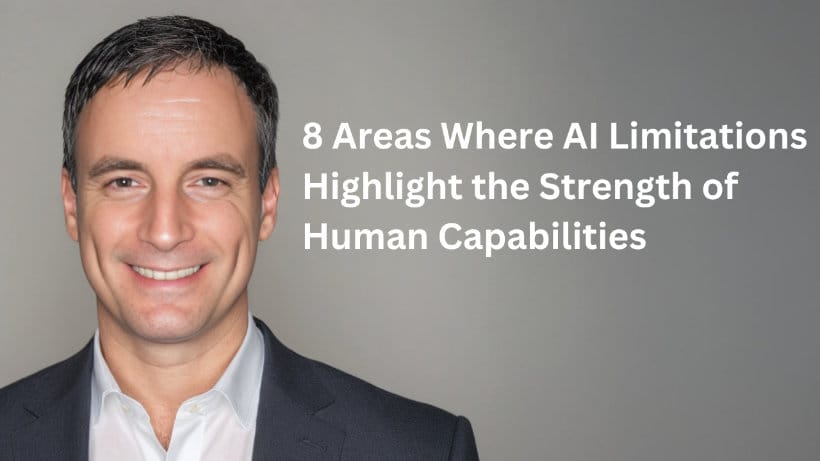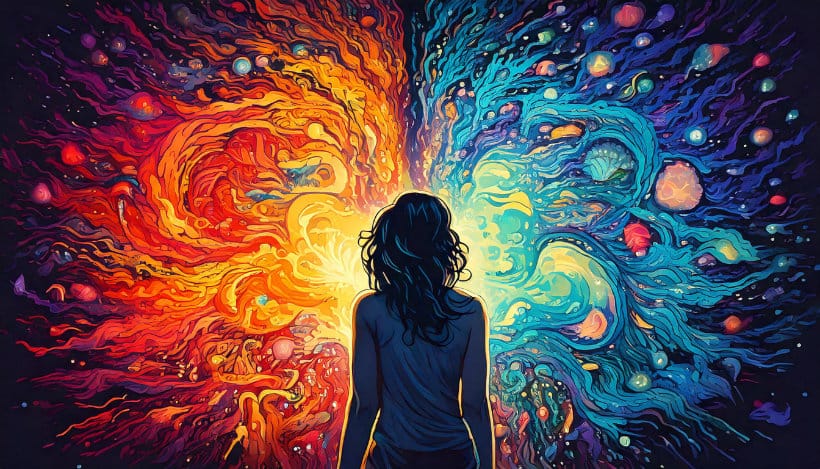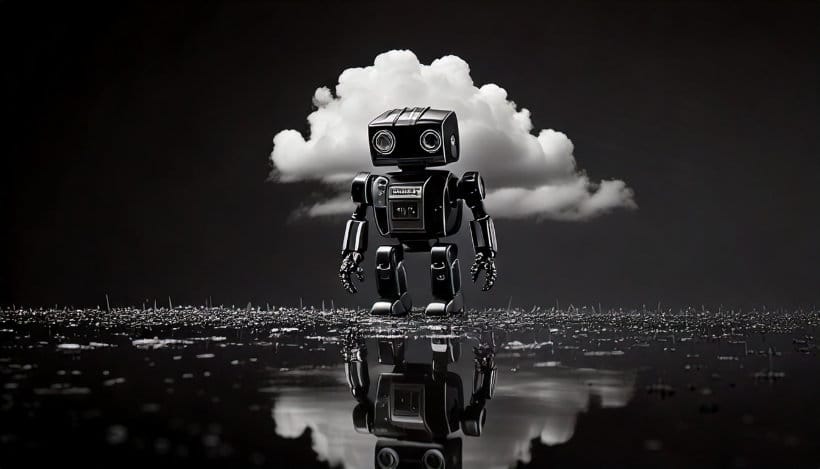Table of Contents

Artificial Intelligence (AI) has made remarkable strides, transforming industries and revolutionizing how we live and work. Yet, for all its advancements, AI limitations remain significant when compared to human capabilities. From empathy to creativity, there are areas where humans remain uniquely skilled, highlighting the enduring value of human intelligence.
Here are eight key areas where AI has a long way to go before it can match what humans do effortlessly:
1. Empathy and Emotional Intelligence
AI can analyze words, tone, and facial expressions to infer emotions, but it cannot truly understand or feel them. Genuine empathy requires the ability to connect on a deeply human level, something AI fundamentally lacks. For example, while an AI-powered mental health chatbot might recognize sadness in a user’s message, it can only offer preprogrammed advice, not the comfort and emotional support a human counselor can provide. This limitation makes AI poorly suited for roles requiring genuine emotional connection, such as therapy or caregiving.

2. Contextual Understanding
AI struggles to grasp the full context of a situation, often missing subtle cues or nuances that humans interpret naturally. For instance, a conversational AI might misunderstand sarcasm or generate a response that’s technically accurate but contextually inappropriate. Similarly, in real-world environments like driving, AI systems may fail to interpret human gestures, such as a pedestrian’s wave to indicate it’s safe to proceed. Without this situational awareness, AI cannot match the flexibility and reliability of human decision-making.
3. Intuition and Gut Feelings
Humans have an incredible ability to make decisions based on instinct, even when there’s limited information. This “gut feeling” often stems from subconscious pattern recognition and life experience. AI, on the other hand, relies on explicit data and predefined algorithms. For example, a human stock trader might sense market trends based on subtle shifts, whereas AI would need large amounts of historical data to even approach a similar insight. This instinctive decision-making is a uniquely human strength.
4. Abstract and Creative Thinking
AI can generate art, music, and even text, but it operates within the confines of its training data. Human creativity, on the other hand, thrives on abstract thought and the ability to make connections between seemingly unrelated ideas. For example, AI can compose a symphony in the style of Beethoven, but it cannot invent an entirely new musical genre. True innovation and originality remain the domain of human minds.

5. Ethical Reasoning and Moral Judgment
Ethics and morality are deeply subjective and often depend on cultural, societal, and situational contexts. AI lacks the ability to weigh competing values or make decisions rooted in moral principles. For instance, an autonomous vehicle faced with a “trolley problem” scenario—choosing between two harmful outcomes—can only follow its programming, without the nuanced reasoning a human might bring. These limitations underscore the importance of humans in guiding the ethical use of AI.
6. Adaptability to Unpredictable Scenarios
Humans excel in novel and unpredictable situations, quickly assessing what’s happening and adapting accordingly. AI, by contrast, struggles outside the bounds of its training data. Consider a robot designed to navigate a warehouse: if a new obstacle appears, such as a spilled liquid, the robot might fail to adapt, while a human worker would instinctively adjust. This adaptability makes humans indispensable in dynamic, real-world environments.
7. Holistic Understanding of Human Wellness
AI can analyze medical data and identify patterns, but it cannot fully grasp the complexity of human health and well-being. Wellness is multifaceted, encompassing physical, emotional, social, and mental aspects that interact in deeply personal ways. For example, an AI might recommend treatments based solely on symptoms, but a human doctor considers factors like the patient’s lifestyle, preferences, and emotional state, delivering care that AI simply cannot replicate.
8. Cultural Understanding and Creation
AI lacks the ability to truly appreciate or generate cultural nuance. Culture is deeply rooted in history, shared experiences, and human creativity, which AI cannot fully comprehend. For example, AI-generated content often misses the subtleties of humor, irony, or symbolism that resonate within specific cultural contexts. Similarly, while AI can mimic styles of art or storytelling, creating something that genuinely reflects a culture’s essence remains beyond its reach.

Why These AI Limitations Matter
These AI limitations highlight the enduring value of human intelligence, creativity, and emotional depth. While AI is an incredibly powerful tool, it should be seen as a way to augment human capabilities rather than replace them entirely. By understanding where AI falls short, we can focus on designing systems that complement human strengths, ensuring that technology serves humanity’s best interests.
“While AI is an incredibly powerful tool, it should be seen as a way to augment human capabilities rather than replace them entirely.”
Final Thoughts
As AI continues to advance, it’s important to recognize both its potential and its limitations. Humans bring empathy, intuition, creativity, and ethical judgment—qualities that machines cannot replicate. By appreciating these uniquely human abilities, we can better navigate the evolving relationship between AI and society, ensuring that this transformative technology enhances, rather than diminishes, what makes us human.
What do you think? Are there other areas where you feel AI still has a long way to go compared to human abilities? Share your thoughts, examples, or questions in the comments below—I’d love to hear your perspective on the unique strengths that make us human and how AI can complement those skills! Let’s start a conversation.
Note: AI tools supported the brainstorming, drafting, and refinement of this article.
Jacob is a seasoned IT professional with 20+ years of experience and a proven track record of driving business value in the financial services sector. His extensive expertise spans Business Analysis, Knowledge Management, and Solution Architecture. Skilled in UX/UI design and rapid prototyping, he leverages comprehensive experience with ServiceNow and ITSM competencies. Jacob’s passion for AI is reflected in his Azure AI Engineer Associate certification.